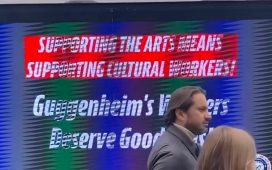The Courtauld Institute of Art in London, the UK’s only higher education institution to focus solely on the history and conservation of art, has announced it will enter into a ten-year “strategic partnership” with its neighbour on The Strand, King’s College, London.
The move will allow the two institutions, both of which are self-governing bodies of the University of London, to pool together teaching resources, offer joint degrees and share facilities, according to an official release.
Post-graduate courses co-convened by both colleges are now being developed and will likely be offered from the 2024/25 academic year. Students who take these courses will graduate with a degree awarded by both institutions. Meanwhile undergraduate students at King’s (which does not offer history of art) will be able to take modules taught at The Courtauld, and vice versa.
Deborah Swallow, Evelyn Welch, Shitij Kapur and Alixe Bovey, heads of King’s College, London and The Courtauld institute
“Our students are curious about other subjects; this partnership will allow us to tackle one of the biggest problems facing a niche institution,” says Alixe Bovey, dean and deputy director of The Courtauld. “Art history is a fundamentally cross-disciplinary field—conservation requires physics and organic chemistry, and any study of art history bridges modern language and literature too.”
The partnership will also allow Courtauld students to benefit from King’s well-funded digital humanities department.
The two institutions have vastly different sizes. King’s College, a large multi-faculty, public research university established in 1829, counted 33,110 students and more than 5,000 academic staff during the 2019/20 academic year. The Courtauld numbered 545 students and around 50 academic staff in the same period.
The LVMH Great Room at the newly renovated Courtauld Gallery
According to Bovey “no money has changed hands” in this new relationship, and she stresses that The Courtauld will remain an “independent institution” whose research funding will not be affected. Responding to whether the partnership might undermine one of The Courtauld’s key draws—its small size—she says that “our class sizes and extreme commitment to research are not things we are about to roll back on”.
“Uncertain time for arts education”
But Bovey also hints that the partnership might be a lucrative one, saying “investment in and revenue from any new venture—such as a new course—will be shared in a way commensurate to each partner’s contribution”.
It comes at a critical time for arts and humanities departments at higher education institutions in the UK, which are seeing their government funding being slashed. Last year the UK announced a 50% cut to arts courses (focusing mainly on studio-based art courses), although funding for specialist institutions such as The Courtauld increased by £10m to £53m.
Bovey agrees that this is “an uncertain time for humanities and arts education”, although she adds that the worst hit subjects—archaeology, studio and performance-based practices—are not subjects The Courtauld teaches.
“It’s not a kneejerk reaction to a sudden cut, but the current situation is certainly one that we watch with real concern. A weakening of any part of the field is a detriment to us all,” she says.
Other facilities that will soon be shared by the two institutions, include clubs and societies, sport facilities (of which The Courtauld has very few) and accommodation, with King’s halls now available to Courtauld students, allowing for more of them to live on campus. Meanwhile, King’s students now have free access to The Courtauld Gallery, which houses the institution’s prized collection of 19th- and 20th-century art. The gallery reopened to the public in December following an extensive £57m renovation. Meanwhile, in 2016 King’s began a £1bn redevelopment programme of its estates.








